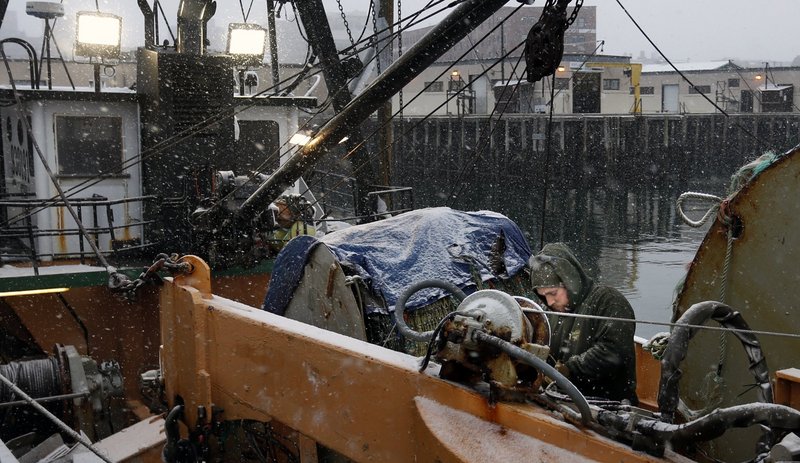PORTLAND – The recent vote by the New England Fishery Management Council to cut Gulf of Maine cod quotas by 77 percent is yet another blow to Maine groundfishermen. Whether this will be the one that finally knocks out the fishermen (and the businesses that rely on them) is too soon to tell.
Adding insult to injury is the unfair perception that the fishermen themselves are to blame for the current state of affairs because of perceived “overfishing.” It’s time to stop blaming fishermen and bore down into the underlying causes and policies that may be contributing to the crisis.
In addition to considering the possible effects of climate change, honest scrutiny needs to be directed at elected officials, regulators, bureaucrats and scientists and the work that is being done on fisheries management. These are the officials charged with oversight of the resource, and they need to share in the accountability for its failure.
It is not unreasonable to ask why, in 40 years of management and regulation, the resource is arguably in as bad a shape as it has ever been. Climate change does not explain it all.
The unfortunate truth is that what was once an epically abundant resource teeming with healthy stocks of groundfish in the Gulf of Maine has been managed and protected to the point of collapse. Yet with every new stock assessment crisis, we see the same headline: “Overfishing results in cuts.”
“Overfishing” and “overfished” are legal terms of art used in the most recent authorization of the Magnuson-Stevens Act, the federal law that regulates fishing in the United States’ territorial waters.
This law requires a given species to be classified as “overfished” when scientific and empirical data determine that the species is below acceptable biomass and recruitment numbers for the goals that have been set. If that is the case, then steps need to be taken to end the conditions within a certain time frame.
The unfortunate connotation, however, is that the fishermen, and their greedy indifference to the resource, are the problem. But fishermen catch only what regulators have determined can be caught within the management plan — often far less.
Instead of using the term “overfishing,” perhaps news coverage should use “mismanagement” or “overprotection” as the underlying cause leading to quota cuts and a crisis. It is not completely out of bounds to question which is more accurate in describing the current state of affairs.
The science that the regulatory process relies upon for setting sustainable catch quotas has been imperfect at best and at times downright inaccurate.
It is a hard job to count the fish in the sea. No one disputes that. But regulators are also making decisions based on values — the values of those who influence them.
These values come out in the form of policy decisions such as the protection of dogfish or harbor seals, which has a direct impact on the health of groundfish stocks. Fair questions need to be posed about how priorities are set and who has influence in the regulatory process.
It may come as news to many that groundfishing in Portland and in Maine is not actually dead. It is just a far cry from what it used to be and maybe could be again.
The guys (and gals) who are left are the best of the best, running lean and mean and working hard to eke out a living in a difficult regulatory environment and with few true allies. These are the ones who bring us the healthy, wild-caught, fresh, local Gulf of Maine cod, haddock, pollock, hake and redfish in the seafood display for a reasonable price — the ultimate locally sourced organic food.
This is also the same industry that employs folks at the Portland Fish Exchange, Vessel Services and the processors on the Fish Pier — the truckers, shippers, suppliers and more all up and down Commercial Street and up and down the coast.
This is a real economy and adds a significant value to our state in many ways. If and when it is gone, we will all be worse off.
No, groundfishing in Maine is not dead yet, but it is on life support. Especially now. It is time to stop simply blaming the fishermen for the problem and expect more from our elected officials, regulators and scientists to work with fishermen and all interested parties to find solutions and get our Gulf of Maine resource back to a healthy and balanced condition that works for everyone.
Alan Tracy of Freeport is an attorney and CEO of Vessel Services Inc. in Portland.
Send questions/comments to the editors.



Success. Please wait for the page to reload. If the page does not reload within 5 seconds, please refresh the page.
Enter your email and password to access comments.
Hi, to comment on stories you must . This profile is in addition to your subscription and website login.
Already have a commenting profile? .
Invalid username/password.
Please check your email to confirm and complete your registration.
Only subscribers are eligible to post comments. Please subscribe or login first for digital access. Here’s why.
Use the form below to reset your password. When you've submitted your account email, we will send an email with a reset code.